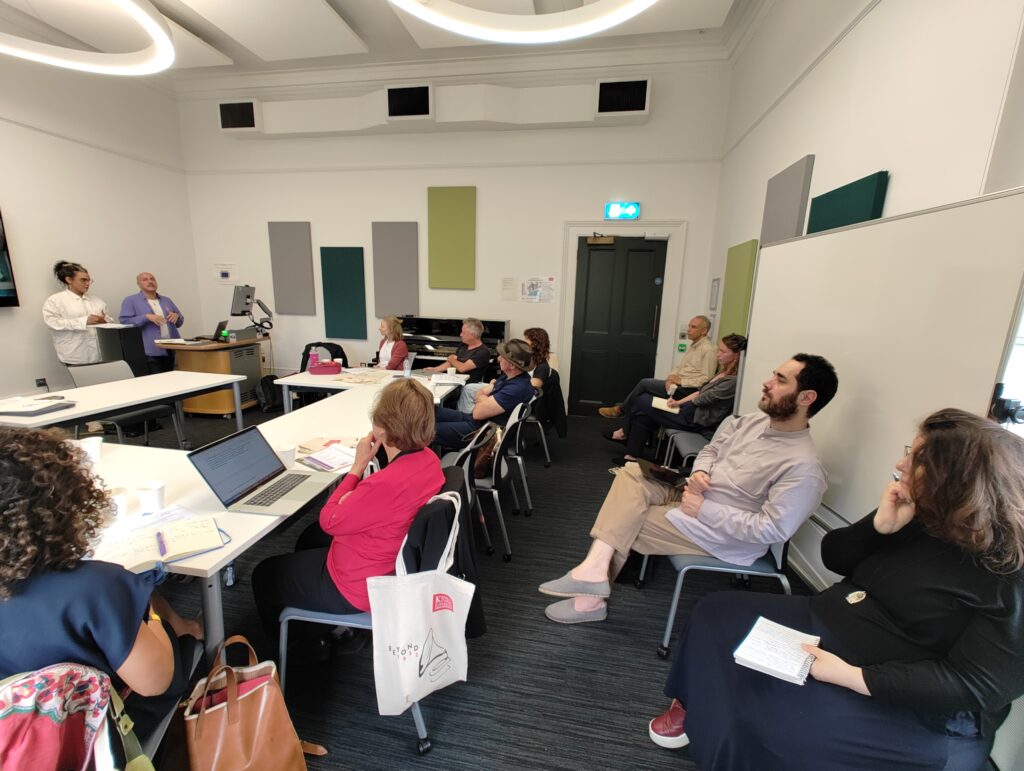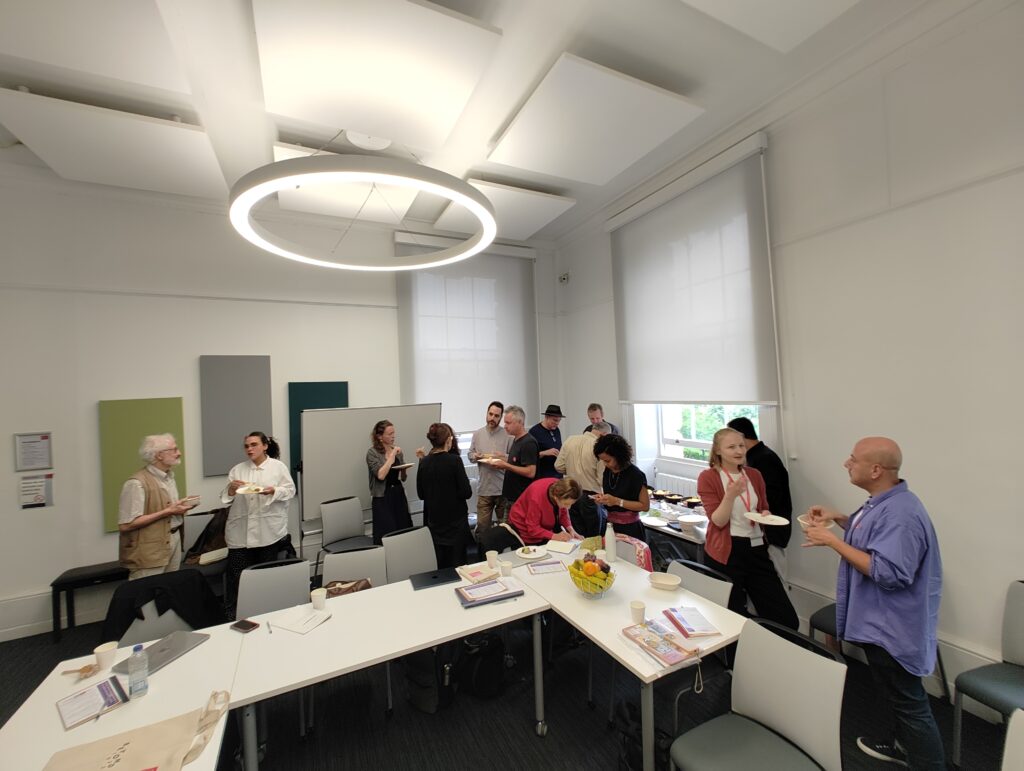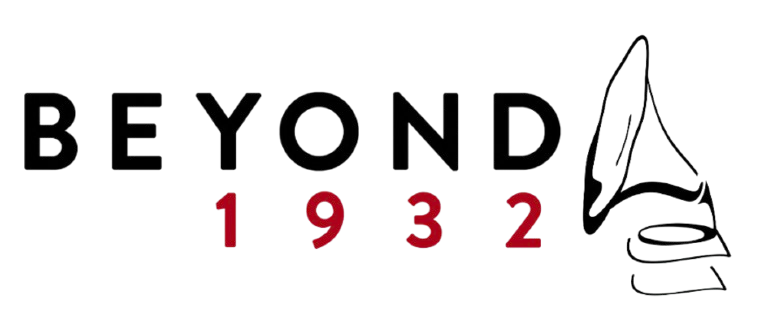
The workshop was a two-day information and discussion extravaganza, which actually opened the evening before with a fascinating pre-workshop seminar by Jean Lambert on his new publication Bernard Moussali, Le Congrès du Caire de 1932: La musique arabe à la recherche de son identité (Paris, Geuthner, 2024).
The organisers Yara Salahiddeen and Sophie Frankford opened the workshop with contextualising it within broader currents, commenting on how sonic archives as a key legacy were returning again to academic interest; not only for historians but also for practice-based artists.
Panel one (Alia Mossallam, Arthur Asseraf & Hajer Ben Boubaker. Discussant: Jean Lambert) concerned colonial archives, which highlighted how archives and their use is fraught in many more ways than ‘just’ securing access. It was particularly interesting to consider the effects of motivations by the ‘owners’ of an archive, for want of a better word. The lack of linguistic capacity to know exactly what is in the archive they moderate access to manifests itself in a reticence to allow access for fear of what others might find out. Alia also spoke at length about finding a way to reclaim the content of the archive for the communities from which it was extracted; a consideration that rightly deserves attention from archive users.

Panel two (Yara Salahiddeen, Claire Cooley. Discussant: Salwa El-Shawan Castelo-Branco) explored collections and the circulation thereof. Looking at interactions with archives as affective sites of memory, but also as inspiration for contemporary artists. Growing interest in the early recording era as complex sites of ‘tarab’ highlighted the cultivation of a renewed ‘tarab’ listening practice by these groups. Claire Cooley pitched the term ‘sonic stardom’, related to recognition through inscription, not just image or performance: “voices could travel before bodies could”. The materiality of the record, and its ability to circulate, played a large part in dispersing artists far beyond their own locality, and created the sonic infrastructure we can encounter today. Digital platforms such as WhatsApp and social media featured in both papers as contemporary collection and circulation routes of the early recording era archive.
Panel three (Rim Irscheid, Mhamad Safa. Discussant: Thomas Burkhalter) was on sound art and archives of feeling. This was a tale of two halves: performing silence through artists pulling their work from exhibitions, and exposure to loudness and sound in relation to trance and trauma. Both papers, in their own ways, concerned themselves with the absenting of human agents and the presence of non-human agents. Absenting oneself in response to institutional silences, the disappearance of Palestinian art and culture as direct action, the power to shape narratives, but also as (self)care, highlighting the emotional labour required. At the other end of this panel’s spectrum: the presence of spirits within percussive rituals, the exploration of which Safa related to a critique of exclusionary yet widely adopted Western epistemological frameworks.
Panel four (Sophie Frankford, Cüneyt Çakılar. Discussant: Bashir Saade) concerned creative catalysts and how scenes and scores that are often ‘written off’ as ‘less’ actually hold real creative potential. Revivals, both of the Turkish queer kanto scene and the sheet music on the Cairo used good market, ebb and flow through time as these creative expressions’ meaning ebbs and flows. That is not to say they are ever out, but that they resonate more at times, whether that is in the context of ‘heritage making’ and the complexities around empire and nation building, or whether they are artifacts in the relationship between looking, listening, and touching for visitors to the Cairo used good market. A note of personal interest: Cüneyt mentioned kanto revivals in the 30s and following the military junta in the 60s, and Sophie mostly saw notation from the 20/30s and the 50/60s – kanto and scores themselves may have very little overlap, but the revivals they are part of reflect a more globalised beat.
Panel five (Susannah Knights. Discussant: Cristina Moreno Almeida) dived deeper into private radio stations in Tunis, with a fascinating look at the choices made by two private radio stations. Not only what they played, but their playlisting logic was discussed, opening a window into how this shaped opinion of the radio stations. In particular it was interesting to hear how the mixing of playlists was judged: ‘properly’ mixed with good musical progression between songs, versus moving rather abruptly from one block of pre-programmed music to the next. The difference in terminology – ‘cocktail’ vs ‘mixed’ carried judgement: “Station Misk has started doing cocktails” (said with disdain), showed the power of opinion, even if the intention of the radio station was misconstrued. The boxing or archiving of artists into genres in the process of playlist mixing, particularly in the ‘cocktail’ mixing rather than the more ‘sensitive’ mixing done by Misk initially.
The two days ended with a thought-provoking keynote by Charles Hirschkind — Sounding Out The Past: Andalucismo, Flamenco, Worldmaking — and ensuing discussion with Martin Stokes. A key line of discussion was how musical attunement permitted inhabiting a particular past, in particular historical pain, and how it shapes personal reality in the present. The social life of pain allows one to relate to others, and encounter the generational pain as a society. The skills involved in navigating such encounters are just one way the keynote encouraged thinking about archives as emotion. Connections between Jean Lambert’s pre-workshop seminar and Charles Hirschkind’s keynote could be found in many of the literary personas referenced (Blas Infante, Garcia Lorca), who were also concentrated around the early 1930s.

In short: an intense and extremely well-spent two days! I found the entire event very well organised, and an abiding memory was one of friendliness and approachability, especially from those scholars I was somewhat star-struck to actually meet in person… Personally I was most struck by the reflection of what it means to listen to an archive; not just the difficulty in access, or the direct/surface meaning of what is being said, but, as Alia phrased it, the entire ‘extraction process’: voice, history, family, details. Archives hold not only information, but also personal histories related to contemporary communities. How you bear witness to the archives you use, is food for thought.
Mez Dubois-van Slageren is doing a part-time PhD under Martin Stokes, looking at the relationship between migration and developments in contemporary performance practice of Arabic musical heritage, with a particular focus on Syria and Egypt.

